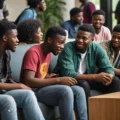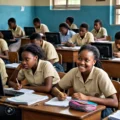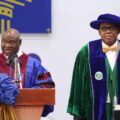“Nigeria Needs Better-Equipped Universities, Not Government Overdependence” — Okonedo Speaks Out
In this interview with CHARLES OGWO, Enase Okonedo, the first female vice-chancellor at Pan Atlantic University, explains why Nigeria needs more universities and a reconsideration of reliance on government funding for universities, given that approximately 75% of UTME students are denied admission each year due to underfunded and ill-equipped institutions. Excerpts:
Congratulations on winning the Harambee Award for 2025. For you and PAU as a whole, what does this prize mean?
Receiving the medal humbled me, and I feel incredibly honored to have been recognized for it.
It motivates me to work harder not only because I will win more accolades but also because it will encourage other women to intentionally pursue excellence in their careers.
Over the past thirty years, I have dedicated my professional life to paving the way for more women to hold leadership roles, primarily to guarantee that women are not subjected to discrimination but are granted equal opportunities alongside males.
Pan Atlantic University is renowned for encouraging students to pursue careers and entrepreneurship. What guided this endeavor?
It is, in my opinion, the acknowledgment of the principles that have defined the university and the Lagos Business School.
Making sure we produce qualified professionals who will later serve with personal social responsibility and initiatives is the main goal of our mission statement.
It used to be practically a given that a student would find employment after earning a university degree, but that is no longer the case, which contributes to the high unemployment rates.
Students at Pan-Atlantic University are equipped for employment and are instilled with a spirit of initiative. Using education as a tool to serve and change society is our admissions statement. We train people for employment as well as for starting their own business.
What are you doing to encourage gender diversity in leadership positions as the first female dean of LBS and one of the female vice-chancellors in Nigeria?
Being the first female vice-chancellor of Pan-Atlantic University and the first female dean of Lagos Business School, I am grateful that the organization’s founders and leadership went beyond gender to ensure my appointment.
Because women manage families and raise children, it is important to support them in the workplace so they can accomplish their goals. This highlights the need to guarantee that women hold leadership roles and that policies are in place to encourage women to stay in the workforce, regardless of their roles outside of it.
Many Nigerian women believe that some jobs are unattainable. Given the small number of women in the political sphere and the treatment of those who do exist, there is significant room for improvement.
In my opinion, women’s dreams should come first. Nothing should stop women from achieving their goals. Have a dream and put in the effort to make it a reality.
In addition to encouraging gender diversity in leadership positions, we must eradicate impostor syndrome to liberate people. Then, in addition to reducing working hours, the institution offers several options to support women in the workplace, including longer maternity leave and childcare facilities for nursing moms.
I make a conscious effort to make sure women are ready for their positions in the workplace. As a result, I mentor women a lot, helping them to overcome the obstacles they still encounter in the workplace today and inspiring them to pursue their goals.
Because of the gender disparity that still exists, I advise women to pursue careers in academia.
Nigeria may make headway in guaranteeing that children attend and stay in school if it can resolve those problems and encourage adult literacy, in my opinion.
In recent years, the number of female vice-chancellors has increased. Who is to blame for this?
I’m not sure if the fact that there are only roughly 32 female vice-chancellors among Nigeria’s more than 200 universities qualifies as a rise.
Yes, there has been an increase, but I am only able to hypothesize as to why. These female vice-chancellors, in my opinion, were appointed to their positions based on their qualifications rather than their gender.
It indicates that gender is not being considered as a criterion for leadership roles in the governing councils or boards of trustees.
A UNESCO assessment estimates that 251 million children worldwide are not attending school, with over 20 million of those children living in Nigeria. How do you feel about this and the future?
I think ignorance and poverty are causing this. Although education is a basic human right, many in poverty must have their children labor at home or their jobs.
Another aspect is ignorance; if the parents are uneducated, they might not see the importance of education; it’s a vicious circle.
Nigeria can make strides in guaranteeing that children attend and stay in school if it can resolve those problems and encourage adult literacy, in my opinion.
The federal government’s program to provide higher education to Nigerians is called NELFUND. However, students at private universities are not accommodated by the implementation. How do you feel about this?
Although the government provided justifications, I believe that it should be accessible to all pupils for the sake of justice and fairness.
Students should still be eligible for student loans even if they attend private universities in order to receive a top-notch education and graduate on schedule.
One could infer that only the impoverished attend public universities based on the justification for limiting access to them. That is untrue; some students enroll in public universities because private institutions do not provide the subjects they desire.
The increasing number of first-class graduates generated by private universities has led to accusations that some of these schools are awarding first-class degrees. How do you feel about this?
What is intended by awarding first-class degrees is beyond me. All respectable universities that wish to establish a solid reputation would, in my opinion, protect the caliber of degrees they award.
When students are unable to support their degrees with their professional behavior, universities cannot deny them their degrees. That would be detrimental to the company.
I believe that learning settings at private colleges might be more favorable; there might be fewer interruptions, and students might have access to more state-of-the-art facilities that allow them to focus more on their studies.
Students who receive first-class degrees, in my opinion, do so because they deserve it.
In the face of underfunded and inadequately equipped universities, particularly public ones, the federal government has authorized the creation of additional ones. Do you believe that Nigeria needs new universities or that its current ones need to be upgraded and properly funded?
Nigeria, in my opinion, needs more universities in addition to modernizing and sufficiently funding its current ones.
Given Nigeria’s population, more universities are required to accommodate the JAMB applicants who are rejected each year.
The issue won’t be resolved even if the current ones are improved and given funding. How can students learn when some colleges have 2,000 students in their first year and only one teacher?
Class sizes and student-teacher ratios must be maintained, and more universities are required in light of our population.
I believe that the nation should reconsider the public universities’ reliance on government grants and subsidies.
We must examine the rules and determine how we might modify them to give state-owned universities some flexibility in charging fees that are appropriate for funding research, providing high-quality education, and covering the wages of teachers.
Over the years, numerous Nigerian colleges have received low rankings from international organizations. What do you believe is responsible for this?
The first step is to find out which indices are being examined and how many Nigerian universities made it into these rankings.
The question is, what will Nigeria do if the measures and indices are applicable worldwide?
This relates to the resources that can be used to create reputable institutions. Universities in Nigeria require funding for research. Examining the metrics is necessary before we can deploy the resources. To what extent do the measures relate to the Nigerian concept?

DOWNLOAD EXAM SCHOLARS 2025 CBT APP ON PLAYSTORE
DOWNLOAD EXAM SCHOLARSS 2025 CBT APP ON THE APPLE STORE
DOWNLOAD EXAM SCHOLARS 2025 CBT APP ON WINDOWS
VISIT EXAMSCHOLARS.COM for more info






